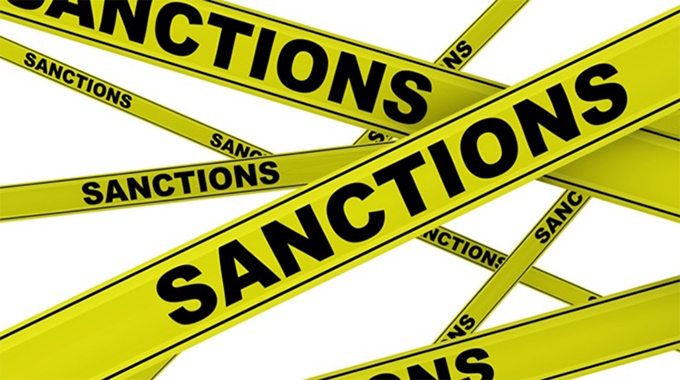Why sanctions should be removed

Mukachana Hanyani
Zimbabwe, which embarked on the land redistribution programme during the turn of the twenty-first century triggered bilateral disagreement with her former coloniser Britain.
The British government under the leadership of Tony Blair, the then Labour party leader, mobilised the Western world to impose economic sanctions on the country claiming citing cooked up reasons of human rights abuse and governance issues.
Britain was able to mobilise the European Union (EU) to impose economic sanctions on the country although technically they were said to be targeted at the top Zanu PF leadership.
The United States of America came up with two Acts which made sure Zimbabwe was put under sanctions.
Alleged failure by Zimbabwean government to observe human rights issues and alleged maladministration in governance issues were just excuses by the British government to impose the sanctions.
The real issues were that the British government and her allies were against the land reform programme which the country embarked on.
Actually, the land reform was meant to correct the land imbalances that were created by Britain during the colonial era.
The African Growth and Opportunities Act (AGOA) of 2000 was enacted by the George W Bush government in the USA to exclude Zimbabwe from trading with the American government.
In 2001, the Zimbabwe Democracy and Economic Recovery Act (ZIDERA) was put in place to make sure all American financial institutions and those aligned to the American government won`t release any financial assistance to Zimbabwe.
Following enactment of ZIDERA, Zimbabwe’s access to international credit markets was blocked.
The country was then forced to virtually operate on hand to mouth, and a significant build-up of external debt arrears became visible and a menace to the country.
This unfavourable development worsened the country’s credit worthiness as its international financial risk profile became obvious.
As it became apparent that the country`s financial profile was now fragile, external financiers and grant offers withheld their financial assistance to the country.
As such, Zimbabwe felt the drying up of her traditional sources of external finance from the International Financial Institutions (IFIs).
The country then failed to receive financial support from the African Development Bank, the International Monetary Fund (IMF) and the World Bank (WB) once sanctions became effective.
In essence, the IFIs stopped their support to Zimbabwe by instituting a number of suspensions on Balance of Payment support, technical assistance, voting and related rights by the IMF, and declaration of illegibility to access fund resources.
All those measures by the IFIs to Zimbabwe meant the country had to struggle to make ends meet.
With no financial inflows to the country, Zimbabwe failed to honour its financial obligations to the IMF and World Bank (although the IMF debt is now cleared).
For that reason, the Bretton Woods Institutions suspended Balance of Payment support and technical assistance to the country.
Consequently, the country’s external payment arrears continually increased from about US$109 million in 2000 to US$5.4 billion in 2017.
The arrears have been rising, now at around 70 percent of the total external debt.
Currently, Zimbabwe is saddled with about US$10.5 billion of debt owed to international financial institutions including the Paris Club, African Development Bank and the World Bank, which has effectively cut it off from multilateral lenders. Regrettably, the lending programme from the World Bank is inactive due to accumulated arrears and sanctions.
With effect from October 2000, the World Bank placed all its International Bank of Reconstruction and Development loans and International Development Association credits to, or guaranteed by Zimbabwe in non-accrual status, resulting in the country being unable to access any loan.
The combined effects of the arrears situation and sanctions have resulted in Zimbabwean companies finding it extremely difficult to access offshore lending, thus, crippling their operations. In the pre-sanctions era, loan inflows to Zimbabwean companies increased from US$134 million in 1980 to US$480 million in the 1990s but fell significantly to an average of US$80 million between 2000 and 2008.
Currently, where the private sector manages to secure offshore financing, it is usually at punitive and exorbitant interest rates.
Moreover, Zimbabwean importers are asked to pay cash upfront, resulting in a significant squeeze on private sector cash flows.
Using cash upfront instead of loans makes companies struggle as some used to get credits then repair after making profits.
So sanctions have destroyed all those privileges on Zimbabwean companies.
This has led to bigger challenges, including under capacity utilization of Zimbabwean companies. Due to declining external budgetary support, Zimbabwe’s budget deficit has largely been financed from domestic borrowing which has triggered high inflation.
With Zimbabwe reeling under sanctions for over two decades, inflation rose, leading to companies closing and some losing employment.
This has forced some Zimbabweans to travel to other countries, especially those in the region. This led to those other countries to accommodate the Zimbabweans, although some of the citizens of those countries end up mistreating the Zimbabweans.
So, the call by different leaders in Africa and outside for sanctions to be removed needs to be taken seriously. Zimbabweans have witnessed their joy and prosperity eroded as they have not been in any stable situation since the turn of the twenty-first century because of the illegal sanctions.
Removal of the illegal sanctions imposed on the country by westerners would bring hope of joy and prosperity to Zimbabweans.









Comments